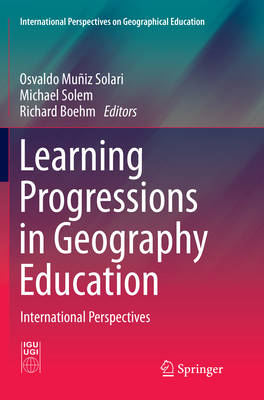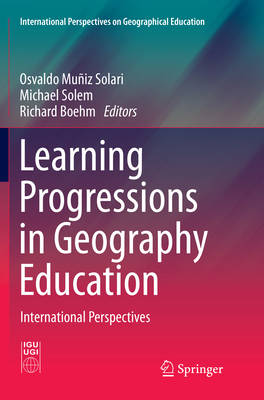
- Afhalen na 1 uur in een winkel met voorraad
- Gratis thuislevering in België vanaf € 30
- Ruim aanbod met 7 miljoen producten
- Afhalen na 1 uur in een winkel met voorraad
- Gratis thuislevering in België vanaf € 30
- Ruim aanbod met 7 miljoen producten
Zoeken
Learning Progressions in Geography Education
International Perspectives
€ 126,95
+ 253 punten
Omschrijving
This book informs an international audience of teachers, scholars and policymakers about the development of learning progressions for primary and secondary geography education in various countries and regions of the world. The book represents an important contribution to learning progressions research and practice. The different chapters explore how curriculum standards and frameworks in different countries portray progress and sophistication in the learning of geography. The book compares educational systems and how teachers and curriculum developers use the concept of "learning progression" to guide educational practices.
As an approach to educational research, learning progressions offer considerable potential for understanding how children develop understanding of geographic concepts and practices across grade bands and in relation to national geography standards.
The book analyzes the general conditions of learningprogressions within the context of a globalized world. Important themes are addressed such as: knowledge acquisition in formal education; measuring learning progressions in informal settings; learning progressions for one curriculum standard or several standards; conditions to assess progression in the learning of facts, concepts, and skills; and multiple pathways for understanding or learning geography.
The contributing authors are experienced scientists in the field from all around the world giving specific insights into the practices of their countries.
The book appeals to K-12 teachers, school administrators, policymakers, researchers in geography education, professors and lecturers at universities around the world.
As an approach to educational research, learning progressions offer considerable potential for understanding how children develop understanding of geographic concepts and practices across grade bands and in relation to national geography standards.
The book analyzes the general conditions of learningprogressions within the context of a globalized world. Important themes are addressed such as: knowledge acquisition in formal education; measuring learning progressions in informal settings; learning progressions for one curriculum standard or several standards; conditions to assess progression in the learning of facts, concepts, and skills; and multiple pathways for understanding or learning geography.
The contributing authors are experienced scientists in the field from all around the world giving specific insights into the practices of their countries.
The book appeals to K-12 teachers, school administrators, policymakers, researchers in geography education, professors and lecturers at universities around the world.
Specificaties
Betrokkenen
- Uitgeverij:
Inhoud
- Aantal bladzijden:
- 174
- Taal:
- Engels
- Reeks:
Eigenschappen
- Productcode (EAN):
- 9783319831183
- Verschijningsdatum:
- 12/06/2018
- Uitvoering:
- Paperback
- Formaat:
- Trade paperback (VS)
- Afmetingen:
- 155 mm x 235 mm
- Gewicht:
- 453 g

Alleen bij Standaard Boekhandel
+ 253 punten op je klantenkaart van Standaard Boekhandel
Beoordelingen
We publiceren alleen reviews die voldoen aan de voorwaarden voor reviews. Bekijk onze voorwaarden voor reviews.










